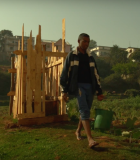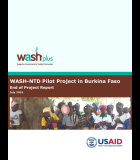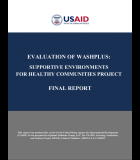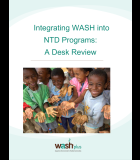Water, Sanitation, and Hygiene Plus – Uganda (WASHplus-Uganda)
In Uganda, WASHplus worked in the districts of Kisoro, Kabale, and Kanungu to strengthen the capacity of USAID implementing partners—SPRING, Community Connector, STAR-SW, among others—to integrate WASH into both nutrition and HIV activities. In these communities access to water is a burden borne by women and children who carry small buckets or jerry cans to distant water points over difficult terrain. What a difference a water-saving tippy tap hand washing station or a rain catchment system can make—examples of small doable approaches that WASHplus promotes.
Coordinating with the USAID Strengthening Decentralization for Sustainability (SDS) project, WASHplus also assisted the three districts in planning, budgeting, implementing, and monitoring USAID-funded WASH improvement grants. With WASHplus support, all three districts implemented a range of WASH activities: managing menstrual hygiene and installing institutional latrines as part of introducing the WASH-Friendly School concept, ending open defecation through community-led total sanitation (CLTS) and sanitation marketing, and addressing water shortages through do-it-yourself (DIY) household rainwater harvesting.
WASHplus technical support also included hosting workshops to bring together district health inspectors, school inspectors, planners, community development officers, and financial and water officers and provided training to strengthen capacity on topics such as CLTS, why WASH matters for HIV and nutrition, inclusive sanitation, menstrual hygiene management and DIY menstrual pads, the small doable action approach, and coordinated planning and budgeting.
In addition WASHplus built on the integration work of its predecessor project (USAID Hygiene Improvement Project) to strengthen USAID implementing partners with the same focus on integrating WASH into HIV programming, although the home-based care context was quite different in the southwest region where the focus is less on routine care and more clinical in nature. At the national level WASHplus worked with USAID’s FANTA project to integrate WASH into Nutrition Assessment Counseling and Support policy and training, and with SPRING and others to roll out the guidance to the local level.
Activity Description
To improve WASH practices, increasing knowledge and awareness was necessary but not sufficient. A host of other factors were also critical to the performance or nonperformance of improved behaviors. WASHplus’s strategy to increase the practice of WASH behaviors was both theory-based and grounded in established best practice. Rather than embracing one particular theory of behavior change, the WASHplus strategy was constructed around the USAID WASH Improvement Framework, which required engagement in three key domains to realize sustained behavior change or WASH improvement:
- Access to hardware and services, such as water supply, soap, sanitation products, and financial products (i.e., loans)
- An enabling environment, which includes a supportive policy environment, institutions with the needed capacities, and coordinated government and nongovernmental organizational planning
- Hygiene promotion and demand creation, which includes social mobilization, community participation, community-led total sanitation (CLTS), social marketing, and behavior change communication
Expected Outcomes
- Increase the availability and use of water supply, sanitation, hygiene (WASH), and indoor air pollution (IAP) interventions.
- Develop and implement WASH/IAP integration strategies.
- Support USAID’s participation in strategic partnerships.
- Develop and test new and innovative approaches and tools.





